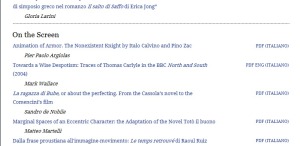Carlyle in H.G. Wells’ The History of Mr Polly (1910)
This blog, as the careful reader will notice, takes a special interest in the reception of Thomas Carlyle, the man and his work, through the ages. An interesting index of his reception in the early 20th century was recently stumbled upon by me in The History of Mr Polly (1910) by H.G. Wells. This comedy – social satire – bildungsroman is a very worthy read in itself (so far, I’m only half-way through), but also has a nice aside on Carlyle.
Parsons is Mr. Polly’s friend and co-worker in the department store. He’s dissatisfied with life in that establishment, as it “keeps down [his] simmering, seething ideas” (350). For Parsons the one great personal virtue is the possession of “Joy de vive” (346, 347), and the great object to be allowed express this quality. As a window-dresser, his opportunities are limited, but he takes it upon himself to institute “a new school of window dressing” (350). Sadly, his innovation of window-dressing as an expression of Joy de vive doesn’t go down well and he has to be dragged kicking and screaming from the window and fired. That’s the end of Parsons. Parsons, then, is impressionable, idealistic and enthusiastic, but crushed by the machinery of the commercial-industrial world.
Parsons is also a great reader. His favoured reading is Carlyle. The following is a passage in which another co-worker reports to Polly on Parsons:
“[He’s] [i]n the warehouse, O’ Man. All among the tablecloths and blankets. Carlyle. He’s reading aloud. Doing the High Froth. Spuming! Windmilling! Waw, waw! It’s a sight worth seeing. He’ll bark his blessed knuckles one of these days on the fixtures, O’ Man.”
He held an imaginary book in one hand and waved an eloquent gesture. “So too shall every Hero inasmuch as notwithstanding for evermore come back to reality.” He parodied the enthusiastic Parsons, “so that in fashion and thereby, upon things and under things articulariously He stands.” (350)
Yeats wrote in the 1890s that Carlyle was the chief inspirer of self-educated men, and Wells’ use supports this. Earlier, in the 1860s, Carlyle’s readership had been judged to be “litterateurs, the more intelligent of our working men, and young thoughtful people generally” (Seigel 431), and still, as late as 1910, Carlyle is associated with youthfulness, and with radicalism, if a particularly impractical form. This short passage from Wells seems to me a good example of how Carlyle was read, when he was widely read. It is easy to read him now and see only the herald of imperialism and fascism, yet that was not how his contemporaries and more immediate successors read him. That is not to argue that the Parsonian reading is actually more in tune with Carlyle’s basic principles and intentions than the standard later reading, but it is only by understanding it can it be understood how Carlyle came to possess such great influence, and not among the imperialists and fascists, but among the writers, the intelligentsia, and, in the political realm, the socialists.
Seigel, Thomas Carlyle: The Critical Heritage (London: Routledge & Kegan Paul, 1971)
Wells, The History of Mr Polly, The H.G. Wells Reader (Taylor Trade, 2003) 337-477

